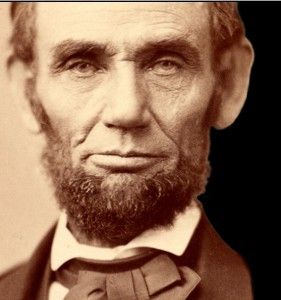 U.S. President Abraham Lincoln’s Baptist upbringing years ago imprinted upon him the moral and biblical wrongness of slavery. Following Lincoln’s presidential victory in 1860, white Southern Baptists and other Southern white religious and political leaders have made a habit of mocking Lincoln as the “black president,” so certain are they that his ultimate goal as president is to free African slaves. Thus far, Lincoln has walked a fine line: opposed to slavery personally and convinced that African slaves must be freed for the preservation of the United States, he nonetheless has–thus far–publicly proclaimed that he would agree to maintain slavery if such a stance would appease the South and lead to a cessation of southern hostilities.
U.S. President Abraham Lincoln’s Baptist upbringing years ago imprinted upon him the moral and biblical wrongness of slavery. Following Lincoln’s presidential victory in 1860, white Southern Baptists and other Southern white religious and political leaders have made a habit of mocking Lincoln as the “black president,” so certain are they that his ultimate goal as president is to free African slaves. Thus far, Lincoln has walked a fine line: opposed to slavery personally and convinced that African slaves must be freed for the preservation of the United States, he nonetheless has–thus far–publicly proclaimed that he would agree to maintain slavery if such a stance would appease the South and lead to a cessation of southern hostilities.
The South, however, has vowed to opposed the “black president” at all costs.
And now, Lincoln takes the first formal step toward doing what he has wanted to do all along, and what he is convinced is a moral and strategic imperative: today, Lincoln reveals to his chief advisors and cabinet his decision to issue a proclamation to free African slaves. But, Lincoln adds, he will wait until the U.S. Army has achieved a significant victory, in order to mute the push back that is certain to come from certain Northern ranks. In fact, it will be exactly two more months before Lincoln makes his decision public.
In the meantime, Lincoln continues making small steps toward Emancipation. In addition to his secret revelation to his advisors and cabinet, the president today publicly issues an executive order authorizing the employment of contraband slaves (slaves freed by the Union Army) in the nation’s army:
WAR DEPARTMENT
1. Ordered, That military commanders within the States of Virginia, South Carolina, Georgia, Florida, Alabama, Mississippi, Louisiana, Texas, and Arkansas in an orderly manner seize and use any property, real or personal, which may be necessary or convenient for their several commands as supplies or for other military purposes; and that while property may be destroyed for proper military objects, none shall be destroyed in wantonness of malice.
2. That military and naval commanders shall employ as laborers within and from said States so many persons of African descent as can be advantageously used for military or naval purposes, giving them reasonable wages for their labor.
3. That as to both property and persons of African descent accounts shall be kept sufficiently accurate and in detail to show quantities and amounts and from whom both property and such persons shall have come, as a basis upon which compensation can be made in proper cases; and the several Departments of this Government shall attend to and perform their appropriate parts toward the execution of these orders.
By order of the President:
EDWIN M. STANTON,
Secretary of War.
Sources: “Lincoln Tells His Cabinet About Emancipation Proclamation” (link); Abraham Lincoln’s Executive Order Authorizing Use of “Contrabands” (link)


